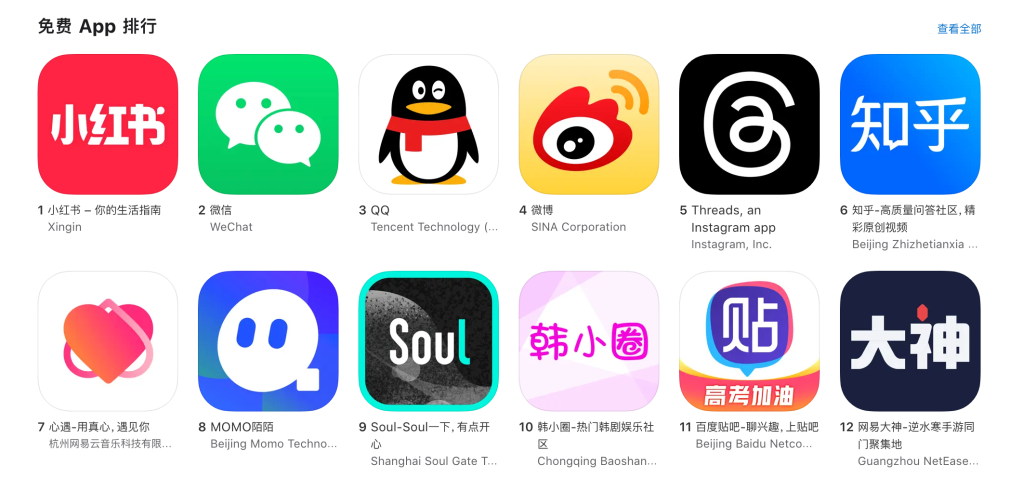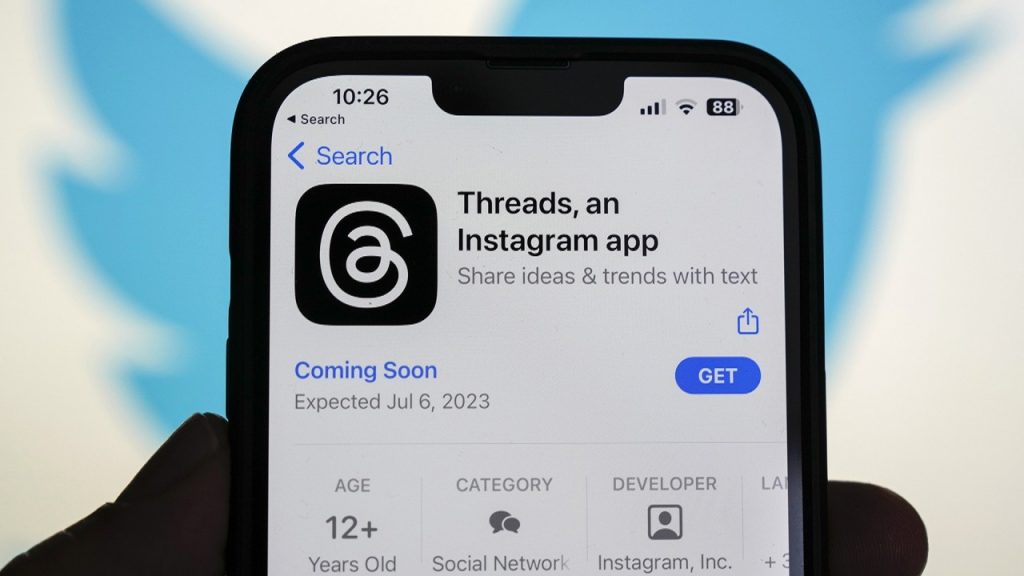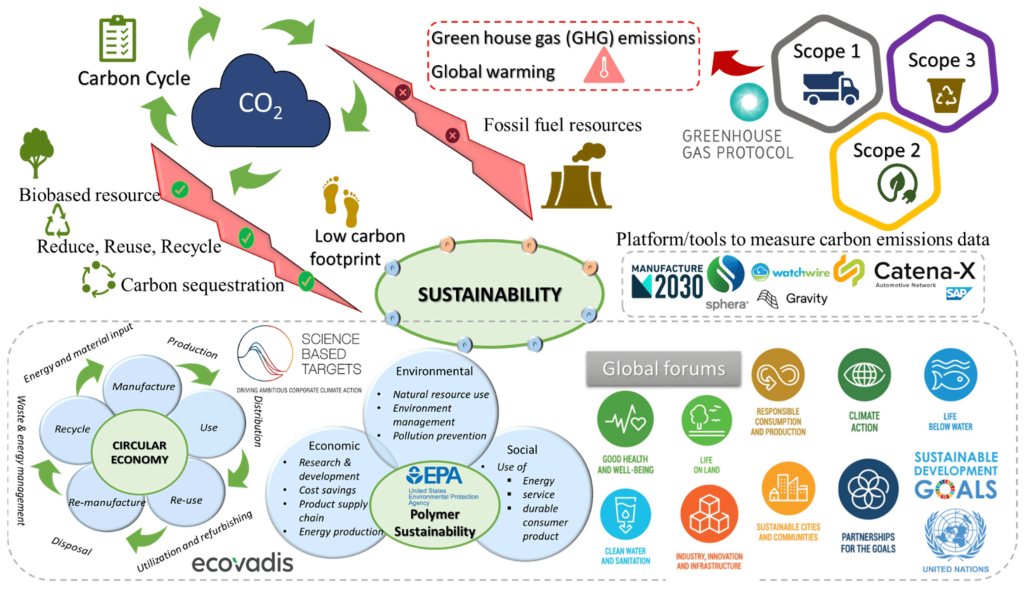Threads, Meta’s latest social networking platform, is swiftly gaining traction in China, where prominent Western social apps such as Instagram and Facebook are restricted. Despite being blocked by the Great Firewall, Threads, a Twitter-like service from Instagram, has already secured the fifth position in the social networking category on Apple’s China App Store within just one day of its launch. Mainland China users must use censorship-circumvention tools like VPNs to access the platform. Despite this hurdle, Threads’ rapid ascent underscores its potential appeal in the Chinese market.”
Introduction
The intersection of technology and regulation often serves as a battleground where innovation clashes with governance, manifesting in conflicts over control, access, and influence. The saga of the Threads app epitomizes this tension, epitomizing the resilience of digital platforms in navigating regulatory hurdles while illuminating the complexities of China’s app market. In this study, we embark on a comprehensive journey to dissect the Threads phenomenon, unraveling its enigmatic trajectory and unraveling the underlying forces propelling its ascent in defiance of bans and restrictions.

Unveiling Threads – An Overview
Threads, Meta’s innovative social networking platform, introduces a dynamic approach to connectivity. Offering a fresh perspective in a landscape dominated by bans on Western social apps in China, Threads swiftly rises to the top echelons of the App Store rankings. Despite facing hurdles imposed by the Great Firewall, Threads defies limitations, capturing the attention of users eager for new avenues of interaction. With its intuitive interface and seamless user experience, Threads transcends barriers, fostering connections across borders. Positioned as a compelling alternative, Threads represents Meta’s commitment to innovation and inclusivity in the global digital sphere.”

The Ban Conundrum – Regulatory Challenges and Responses
Navigating through regulatory hurdles presents a complex landscape for businesses and policymakers alike. The challenges are multifaceted, whether it’s restrictions on social media platforms or trade embargoes. Governments grapple with balancing national security concerns against fostering innovation and economic growth. Meanwhile, businesses must adapt swiftly, employing strategic maneuvers to comply with regulations while maintaining operational continuity. Collaborative efforts between stakeholders and innovative solutions such as decentralized technologies offer promising avenues for addressing these regulatory conundrums.

Climbing the Ranks – Threads’ Triumph on China’s App Store
Threads, Meta’s pioneering social networking platform, defies barriers to success as it ascends the ranks of China’s competitive App Store. Despite facing regulatory hurdles and being blocked by the Great Firewall, Threads swiftly claims a prominent position. Its rapid rise underscores its appeal and resilience in the Chinese market, offering users an alternative amid restrictions on Western social media apps. This triumph showcases both the platform’s innovation and the evolving landscape of digital connectivity in China, signaling a new chapter in cross-border social networking.”

User Perspectives – Insights from the Ground
Threads’ success on China’s App Store requires a closer look at user perspectives. Despite regulatory challenges, users’ embrace of Threads highlights a growing demand for alternative social networking platforms in China. From navigating censorship circumvention tools to accessing a diverse range of content, users’ experiences offer valuable insights into the evolving landscape of digital engagement. By analyzing their motivations, behaviors, and feedback, we better understand the platform’s impact and potential for further growth in this complex and dynamic market.”

The Ripple Effect – Implications and Future Trends
Threads’ ascent on China’s App Store reveals far-reaching implications and foreshadows future trends. Beyond its immediate success, Threads’ triumph signifies a shift in user preferences and regulatory dynamics within the Chinese digital sphere. This ripple effect extends beyond mere market competition, shaping the region’s trajectory of social networking and digital innovation. Anticipating future trends, such as increased demand for censorship-resistant platforms and regulatory adaptations, becomes crucial in navigating the evolving landscape of cross-border digital connectivity and its broader societal impacts.
Frequently Asked Questions
What is the Threads app?
The Threads app is a messaging app developed by Facebook (now Meta Platforms, Inc.) that focuses on private sharing between close friends and family members.
Why was the Threads app banned in China?
The specific reasons for the ban may vary, but it could be due to concerns related to censorship, privacy, or competition with local messaging apps.
How did the Threads app defy the ban in China?
It’s still being determined how the app managed to circumvent the ban, but it’s possible that users in China found ways to access the app through VPNs or other methods.
What does it mean for the Threads app to reach the top 5 on China’s App Store despite the ban?
It indicates significant interest and demand for the app among Chinese users despite the ban and potential obstacles to accessing it.
What are the potential implications of the Threads app’s popularity in China?
It could signify challenges for Chinese authorities in enforcing app bans and controlling access to foreign apps. It may also prompt discussions about censorship and internet freedom in China.
Will the Threads app face consequences for defying the ban in China?
The app or its developers could face repercussions from Chinese authorities, although the extent of any penalties is uncertain.
Are there any legal or regulatory implications for users in China who access the Threads app?
Users in China may face risks associated with using banned apps, including potential legal consequences or surveillance by authorities.
What measures can users take to access banned apps like Threads in China?
Users may use VPNs or other circumvention tools to bypass internet restrictions and access banned apps, although doing so may violate local laws and regulations.
How does the Threads app’s popularity in China compare to its success in other countries?
Comparing its performance in China to other markets can provide insights into differences in user preferences, regulatory environments, and cultural factors.
Is there any official response from Facebook/Meta Platforms regarding the Threads app’s popularity in China?
A statement from Facebook/Meta Platforms or its representatives could provide insights into their stance on the situation and any actions they may take in response.
Conclusion
Threads app defied a ban and reached the top 5 on China’s App Store, raising significant questions about the effectiveness of app bans, internet censorship, and user demand for foreign apps in China. Despite being banned, the Threads app’s popularity indicates persistent interest among Chinese users, prompting discussions about censorship, internet freedom, and regulatory enforcement. The incident highlights the challenges authorities face in controlling access to banned apps and raises questions about potential consequences for app developers and users. It will be interesting to observe how the Threads app’s popularity in China evolves and whether it leads to broader discussions about Internet governance and digital rights.

